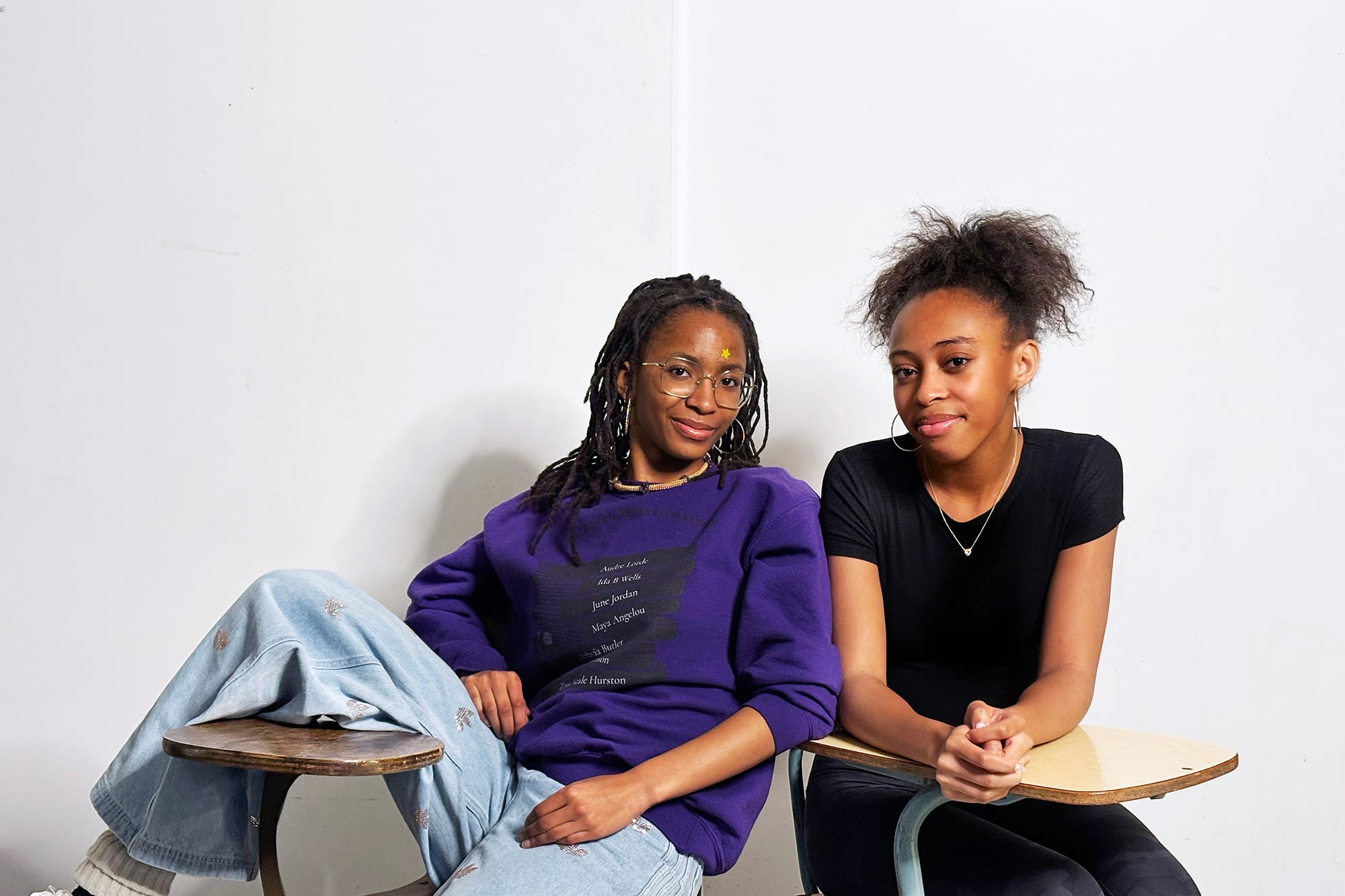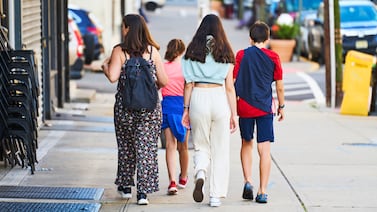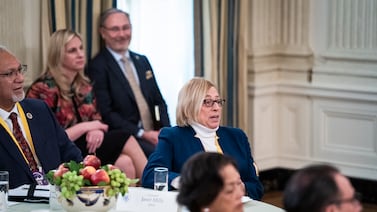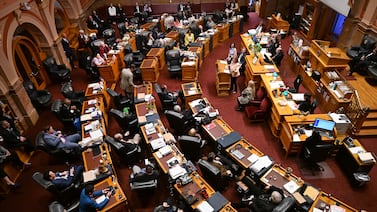Sign up for Chalkbeat New York’s free daily newsletter to get essential news about NYC’s public schools delivered to your inbox.
Are New York City students getting the sex education they need? P.S. Weekly’s episode 2 explores the systemic shortcomings and urgent need for comprehensive — and inclusive — sex education in New York City schools.
Producers Aponi Kafele, a junior at Manhattan’s Essex Street Academy, and Sanaa Stokes, a senior at Manhattan’s Professional Performing Arts High School, expose the patchwork approach to sex education across schools, from anatomy lessons using gingerbread men to teachers who aren’t trained in the subject.
The information gaps are especially concerning for LGBTQ+ youth. One student, who is a member of the LGBTQ+ community, wishes his school offered sex ed where he could ask more questions and get more advice. “I think it’s important for sex ed to normalize sex, especially for people our age,” he told Sanaa. “So we don’t carry on these fears into our adulthood.”
And Aliyah Ansari, a teen health strategist from the New York Civil Liberties Union, explains why her organization is pushing for change, calling on the state to require K-12 comprehensive sexuality education in public and charter schools that would be age and culturally appropriate and medically accurate and inclusive.
“We see time and time again,” Ansari said, “our students are not getting the information that they need.”
P.S. Weekly is available on major podcast platforms, including Apple Podcasts and Spotify. Reach us at PSWeekly@chalkbeat.org.
P.S. Weekly is a collaboration between Chalkbeat and The Bell, made possible by generous support from The Pinkerton Foundation.
Listen for new P.S. Weekly episodes Thursdays this spring.
Read the transcript below
Sanaa: Welcome back to P.S. weekly, the sound of New York City school system. I’m Sanaa Stokes. I’m about to graduate, and I realized something not too long ago, that I’ve never taken a sex ed class.
Aponi: I am Aponi Kafele, and when I was hearing Sanaa speak about it, it actually reminded me a lot of an experience that I had basically my entire public school career. I’ve been taking sex ed class since middle school, where we learned a lot, I suppose. I mean, we learned how to point out the parts on a gingerbread man. So I guess that helped. But if I really think about if I had a fulfilling and comprehensive sex education, I can’t feel like I can say yes,
Sanaa: Our different experiences made us wonder how sex ed looks across the city.
Aponi: I decided to ask students and teachers around my school about their experience. Okay, can you state your occupation for filing?
Teacher 1: Teacher, a high school teacher. I teach English and theater,
Teacher 2: And my occupation is teacher.
Student 1: I am a junior,
Student 2: And I’m in 11th grade,
Aponi: So I know in freshman year, we were doing advisory sex ed classes. Do you remember when we had like, all the- Yes, bro!
Student 2: Oh! The tea cup video, the tea cup video!
Aponi: Okay, okay!
Aponi: Can you share three lessons or activities you did in your advisory sex class?
Student 1: They passed around a dental dam and a feminine condom.
Student 2: They made us watch this video called the tea cup video, which basically correlated consent to drinking tea with somebody.
Student 1: I think they had, like a wooden, like, you know, penis, I think, and then they, you know, demonstrated it like, on how to put on a condom.
Aponi: What would be your dream format for like children across NYC to like have for sex ed?
Teacher 1: I do think there’s something to be said for somebody who is a health teacher and is an expert in delivering that instruction. When you’re an advisor, right? You’re still teaching your subject area, and then you have this additional lesson or lessons per week that you’re trying to craft and think about, and you can, you’ll never going to be able to dedicate the same level of time to it that you would for your subject area.
Aponi: If you could add anything that you felt was missing from the curriculum, what would you add?
Student 2: There’s a lot of things missing. So that’s kind of a hard question. I would maybe talk about, like, what to do if you have a pregnancy scare, because I know a lot of teenagers who have. I would also maybe talk about just, like, literal logistics, because I know this is like, seems like everyone would know, but, like, that’s not true. Like, I know people who have, like, tried to have sex and it didn’t work functionally.
Teacher 2: One of the things that a lot of high school teachers get wrong is that kids really don’t know a lot just because they have the internet. There’s a lot of questions where they really don’t know basic things.
Sanaa: So it’s obvious that there’s a lot missing from sex education in New York City.
Aponi: Right! Like the state requires that all students receive health education, including lessons on preventing HIV and AIDS, but there’s no mandate to deliver separate comprehensive sex education classes. That means it is up to individual schools and teachers to figure out how to teach sex education.
Aponi: And that’s a mess. Some elected officials have called attention to the issue at a hearing last December, City Council person Rita Joseph, grilled the executive director of school wellness programs about it,
Rita Joseph: But earlier you said this was a priority. So if it is a priority, why we’re not prioritizing it?
Executive Director of School Wellness Programs: That’s what we’re working on. That’s part of our job. We have to sort of, you know, there was such a focus on ELA and math, right, with standardized testing, etc, that, you know, we’re moving away from that now. We’re moving sort of portfolio work, and we’re moving to sort of broader literacy, but there was such an emphasis on testing, frankly, that we fell off.
Sanaa: Did the director of wellness just admit that the DOE wasn’t paying attention to sex education?
Aponi: Yep, and it’s not the first time officials have fallen short. The City convened a task force in 2017 to tackle shortcomings in sex ed, and they released a bunch of recommendations to improve it, but the city never implemented them, according to a recent City Council report. More recently, Mayor Eric Adams promised to take a look at the issue.
Sanaa: Don’t tell me. They launched another task force.
Aponi: They launched another task force, and unlike the last time, the new one doesn’t even require an expert in LGBTQ health.
Sanaa: While the new task force grinds away, I recently spoke with a friend of mine about his experience.
Student 3: I identify as a gay man
Sanaa: That’s a friend of mine who’s gone through a New York City School sex education program. He’s not out right now, so we’re protecting his identity. What has your family taught you about sex?
Student 3: From my mom, nothing. We never had a talk that was like informational, like jokes here and there, definitely about the topic. But with, with my dad, there was one time where I was in middle school and I just asked questions, and he told me things, but it was about heterosexual relationships, so not really much that I can carry on with. Now being a homosexual.
Aponi: Can you describe the type of sex education, if any, that you have received at your school?
Student 3: So at my school, I had a two week course of sex ed. In my freshman year, the classes weren’t separated by gender, and they were in a normal classroom. They were 45 minutes long. The teacher was serious, kids, kids took it seriously, and I think it since sex ed isn’t taught so frequently to students, it was something that we all had a genuine interest in and it was more about having sex safely, rather than like specifics in sex, of like things to do and things not to do.
Aponi: Was there any material about LGBTQ plus sex or relationships? And what would you have found helpful to cover?
Student 3: From what I remember, the only inclusion about LGBTQ relationships were talks about consent and having sex safely. I feel like there could have been an inclusion of stronger disease prevention I know in my community, that’s something that even I have questions about now, questions about HIV, questions about how people in the LGBTQ community are sometimes more likely to get diseases like syphilis and gonorrhea and things like that. So I don’t know, maybe something more in that field could have been helpful in that class.
Sanaa: By the way, what comes up next is some pretty graphic depictions of sex acts.
Aponi: Are we allowed to put this in?
Sanaa: I think so. It’s not dirty.
Aponi: Can you think of a time that you felt confused or uncertain about topics related to sexual health.
Student 3: I had questions about how to prepare and safely have anal sex. That isn’t something that I had in my sex ed class. And you know your anus is where your feces come out, and it’s the same place where LGBTQ individuals also can experience wonderful enjoyment. So that little mix was weird to me. It’s like, how do you, how do you balance that out? And that’s something online is a good resource. Of like, you know, how to clean up, how to prepare for that. And also, not only did I utilize online materials, but that is also a question I asked one of my LGBTQ teachers here at my school about, in more specifics, of like, once I started becoming sexually active, I noticed things that were specific to me, about my process, about my body, and I wanted to hear from someone like face to face about maybe their experience, or is this normal, or stuff like that.
Aponi: Have you ever encountered situations where you wish you had more knowledge about sexual health?
Student 3: Yes, when I started getting comfortable talking to my teacher, he brought it up to my attention that it was important to get STI tested every three to six months.
Sanaa: STD,
Student 3: I got STI, sexually transmitted infection,
Sanaa: Okay, Clock me! Clock me!
Student 3: Yeah, there’s a difference. There’s a difference.
Aponi: Something I didn’t…misconception, period.
Student 3: Yes, a misconception. I thought that only people who had sex like super frequently would have to get tested, but my teacher told me that it was important for every person in the LGBTQ community to keep each other safe, especially if you’re having multiple partners, or even having sex with multiple partners, who your partners are having sex with multiple partners, like there’s a whole chain that sex goes through, and it’s important to test yourself.
Aponi: How much of a priority do you think it should be for city leaders to make sex education more inclusive and comprehensive, and why?
Student 3: I think that schools and the city should make it a priority for sex ed to be more inclusive and comprehensive in schools. Because I think there’s many like you mentioned misconceptions about sex and things that people are curious about, and I feel like school is the place where you know learning is allowed, and there’s no such thing as a dumb question, and this is where we come to find the answers at a young age. And, sex is something that I think people my age can sometimes be afraid of, and I think it’s important for sex ed to normalize sex, especially for people our age, so we don’t carry on these fears into our, our adulthood.
Sanaa: How comfortable are you with the idea of being open about your sexual orientation? At this point,
Student 3: I’m comfortable with the idea of my sexual orientation and being open with that. However, I am, most of my family members don’t know, but my family members who are closer in age to me, I have slowly gotten to tell my younger family members at times when I’m ready about my lifestyle and my sexual orientation,
Aponi: Is there, like any particular reason as to why you don’t feel comfortable coming out to like your older family members?
Student 3: I think the way they raised, they were raised and the way that they grew up is definitely different than how I’m growing up now. You know, I’m Gen Z living in New York, liberal yada yada, fill in the blank. And my parents grew up in different countries where they were grow, they’re Muslim, religious, and so am I, and I still keep that part of me close to my heart, and I still practice, but I don’t think they encountered the LGBTQ community in the way that I did. I was introduced to it in TV shows and media at a young age, and even in middle and high school, I’ve gotten to meet people in that community. I think my parents are encountering that still to this day, slowly and not as rapidly as me, and it’s something that they might struggle to understand and grasp, and even if they do, I think they, they would prefer if that sort of community stays away from their family.
Sanaa: That was my friend who prefers to stay anonymous.
Aponi: Coming up an interview with the teen health strategist at the New York Civil Liberties Union.
Sanaa: That’s after the break.
Amy: We hope you enjoy listening to P.S. Weekly as much as we enjoy making it. I’m Amy Zimmer with Chalkbeat New York. We spend a lot of time planning each episode, setting up and conducting interviews, cutting the tape, writing scripts. It’s a long process and totally worth it. But here’s the thing, we don’t have a bunch of money or millions of followers, so we’re counting on you loyal listener to help us get the word out. Take a few seconds and send this link wherever you’re listening to three friends so they too can enjoy P.S. Weekly. Thanks for your support.
Sanaa: Welcome back to P.S. Weekly, where Aponi Kafele and I are talking about sex education in New York City Schools. I’m Sanaa Stokes
Aponi: And I’m Aponi. To start to understand what’s going on with NYC sex ed policy, we talked to Aliyah Ansari. She’s been working with the NYCLU to get mandatory and comprehensive sex ed in New York City schools for over seven years. She’s worked as a teen health strategist at the NYCLU. Do you think we’d have any current misconceptions for CSE? So comprehensive sexuality education? Can you give almost a definition of what it is and what it isn’t?
Aliyah: Yeah, so comprehensive sexuality education is, and I’ll use some keywords, right: Should be K through 12. It should be age appropriate, culturally responsive, inclusive of everyone, whether it be LGBTQ inclusive, racially inclusive, ethnically inclusive, age appropriate, like I said, but we’re going to continue to harp on that because some people have their own misconceptions about whether or not it’s age appropriate and medically accurate and should also fit, you know, national sex education standards, which we have, which someone can look at, is an actual guide, step by step. It shows you what you should teach… from kindergarten all the way to 12th grade, and you can follow that right. And comprehensive sexuality education also helps young people be able to have bodily autonomy, be able to understand healthy and unhealthy relationships, be able to have healthy communication with partners and friends and family, and also just be able to make healthy, informed decisions about their bodies and about relationships.
Aliyah: And I think that if more people realize what it actually teaches, I think more you know students and parents would actually be really on board with it. Because why would, you know, someone not want that… a parent not want their child to learn about consent? Why would they not want… their child to learn about education that helps lower instances of intimate partner violence and bullying. Schooling creates, actually, you know, a healthier school climate…but I think the issue is that people don’t know what sex education actually does, and so I think if you have that better understanding, I think more people would be for it, even though most surveys show, across you know, the country, most parents actually do want sex education, right? You just have a really vocal minority that want to be opposed to it. But many surveys have shown 80, 90% of parents who have taken those surveys actually want sex education for their students and their children.
Sanaa: Speaking of sex education right now, how would you rate isn’t the right word. How would you describe the current state of sexual education in NYC public schools?
Aliyah: So it’s interesting, New York City is slightly different than if you think about in the broad scope of New York State, right? So in New York State, and then we can kind of narrow down New York City. New York State does not require comprehensive sexuality education. All they require is HIV AIDS education. You’re supposed to do about five or six HIV AIDS lessons in middle school and high school, about five in elementary and pretty much that, that stops there, right? And when it comes to health education, we do about 54 hours of health education instruction in middle school and high school. That’s all, that’s all they get. That could be like a semester right of Middle High School. I’m pretty sure some of you have already experienced that, but in New York City, it does actually require sex education. There was a mandate in 2011. The biggest issue that we have, even though they do mandate comprehensive sexuality education in New York City schools, is that there’s not a great way, there’s not really a way to implement or show whether schools are actually teaching it. Every year the school districts say how many percentage of their students have actually done health education, but you don’t know within that health education, how many actually got sex ed? So this is the issue, right? …[You] survey health education, or maybe say 50% of students got health education. I don’t know how many actually were taught sex ed, because there’s no specified number of topics or lessons that they have to teach about sex education. So the issue comes in. How do you know what school is actually going to do sex education? You don’t, right? So that’s a big issue that we have. You know… that is a big, the biggest issue that we probably have when it comes to New York City schools, when it comes to teaching sex education, for sure.
Aponi: That specifically explains a lot of statistics that I ran into like that we ran into researching this. So I remember being like, that’s strangely high, okay, if you say so.
Aliyah: That’s why it’s issue we have. You know, standards for math have standards for science. When it comes to health ed and even more specifically, sex ed, they don’t have that. And it leaves the door open for a teacher to say, Hey, I’m going to teach whatever I want. I’m going to call it sex education. And then what do we have? And that’s a big issue that I have, regardless of whether New York City has a mandate or not, if different schools could do whatever they want. Does it matter if you have a mandate? Not really, right?
Aponi: So I go to school, and I don’t think I’ve really…maybe a sophomore year, but I don’t think I’ve really ever run into material about LGBTQ relationships. How would you describe the current state of teaching about LGBTQ sex relationships and romantic relationships in school.
Aliyah: I would say, probably very lacking. You know… when did we do this report? 2012 – a report called Birds, Bees, and Bias, and there we had FOILed, which is basically asking, requesting sex ed documents from over 100 school districts in New York City, not in NYC, in New York State, rather, and you found that majority of them, yeah, we’re not teaching LGBT inclusive sex education at all. A lot of them just didn’t even talk [about], gender identity, sexual orientation. And sadly enough, I wouldn’t be surprised it’s, you know, roughly still the same. A lot of times, even in some of the greatest like some really good, I say good, not greatest, evidence based curriculum, a lot of times, anything on gender identity, sexual orientation is like an addendum. It’s like, oh, you can do this. And then if you really do want to talk about, here’s another booklet that you can talk about, you know, sexual orientation, gender identity, which is an issue, because what you want to do is have it completely in the like the main text, right? It shouldn’t be some type of addendums or appendix, right? And the issue is that that’s what it makes young people feel.
Aponi: It feels like you’re an addition.
Aliyah: Yes, you feel like you’re addition. Why am I not included in this? And you’re talking about all your students. I am part of your student body, right? You should be have- you should be educating me on everything too that has to do with me as well. And I think some of it could just be, not all of it, but some of it could be that sometimes teachers are just uncomfortable. One talking about sex ed in general, but even more specifically, talking about gender identity and sexual orientation or anything, anything LGBTQ-inclusive, right? And what we see too is even when it comes to health education, you have what up, no, over 100 health ed teachers in New York City, but over about 14,000 teachers were basically selected to teach health education. So like in New York, like New York City or New York State, you have like this, incidental teaching law, where you know what a teacher can teach one subject that’s not they’re not licensed to do if they show competency, and a lot of times that’s what the majority of health ed teachers are doing. They’re not actually licensed in health ed, so they’re maybe music teacher, science teacher, phys ed, any other music, whatever, right?
Aliyah: And so then you have those teachers trying to teach sex ed, you like, I don’t even do health ed. I’m trying to teach sex education. I’m uncomfortable having to have this conversation. And then, yes, some of it could be biased. We’re not going to root that out, unfortunately, but I think some of that still is just a lack of information and knowledge and being able to train teachers to be able to be less biased about things, and also just having more knowledge that they can feel more comfortable having those conversations.
Aponi: You’re working on a campaign to improve sexual education across the state. What exactly are you pushing for?
Aliyah: Yes, so just hot off the presses too, because we’ve been waiting for these bills to be introduced, but you just got introduced in the Senate and the Assembly as our sex education bill is called Healthy and Safe Students Act, and it would require K through 12 comprehensive sexuality education in public and charter schools, and mandate it to be age appropriate, medically inclusive, culturally appropriate, medically accurate and inclusive. And also ensure that schools utilize a curriculum that is based off of national sex ed standards. Being able to mandate that would be an amazing thing, and that’s why we’re really pushing because we see time and time again like live schools just, just don’t have or not getting the information that our students are not getting the information that they need. And this bill would help to rectify that, at least in charges in public schools we don’t have. And you say, what happens in private, but you know, in charge in public schools, how can students participate in creating change, in bringing sex ed to their schools, oh, and communities. So the great thing about this isn’t somewhat good, not good, but a great pivot. That pivot, but I’m offset, of not having a mandate, is that you can individually, go to your individual schools or your district and say, I want you to mandate education in my school district. So you can do that. You can.. get parents involved. You can yourself. Can go to your principal and say, Hey, we as a student body want sex education and see if they will do it, and they can do it if they want, and have a teacher teach it. You can absolutely do that.
Sanaa: Thank you so much for coming!
Aliyah: Thank you for having me!
Sanaa: That was Aliyah Ansari, a teen health strategist at the NYCLU
Aponi: Legislation for sex ed continues to be pushed by NYC teachers and students, and we will not let up. If you’re a student, you can band together with the people from your school to tell your school district to adopt a sex ed course. You have the power.
Sanaa: P.S. Weekly is a collaboration between the Bell and Chalkbeat made possible by generous support from the Pinkerton Foundation, the Summerfield foundation and FJC
Aponi: Producers for this episode were me, Aponi Kafele:
Sanaa: and me Sanaa Stokes, with reporting help from Chalkbeat reporter Alex Zimmerman,
Aponi: Our executive producer for the show is Ave Carillo,
Sanaa: and executive editors are Amy Zimmer and Taylor McGraw.
Sanaa: Additional production and reporting support was provided by Mira Gordon, Sabrina DuQuesnay and our friends at Chalkbeat. Our engagement editor is Carolina Hidalgo. This episode was made using Hindenburg. Music is from the blue dot sessions, and the jingle you heard at the beginning of this episode was created by the one and only Erica Huang.
Sanaa: Next week. P.S. Weekly will be taking a little pause since it’s spring break, but we’ll be back the week after that. Thanks for listening. See you next time!
We make transcripts available for our episodes as soon as possible. They are not fully edited for grammar or spelling.








